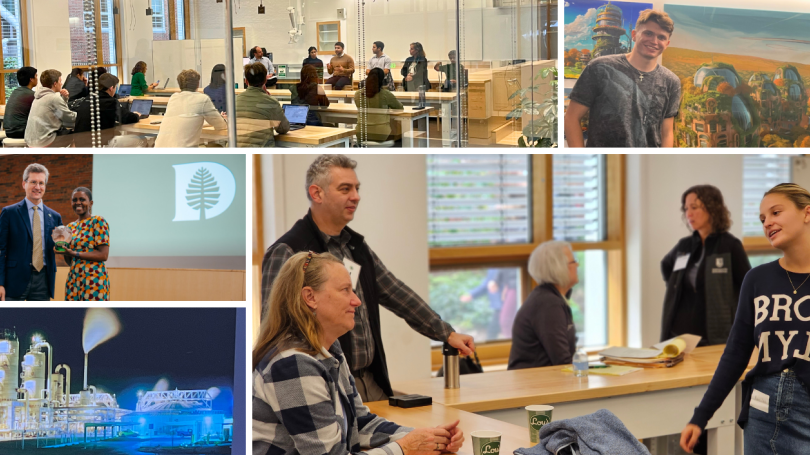
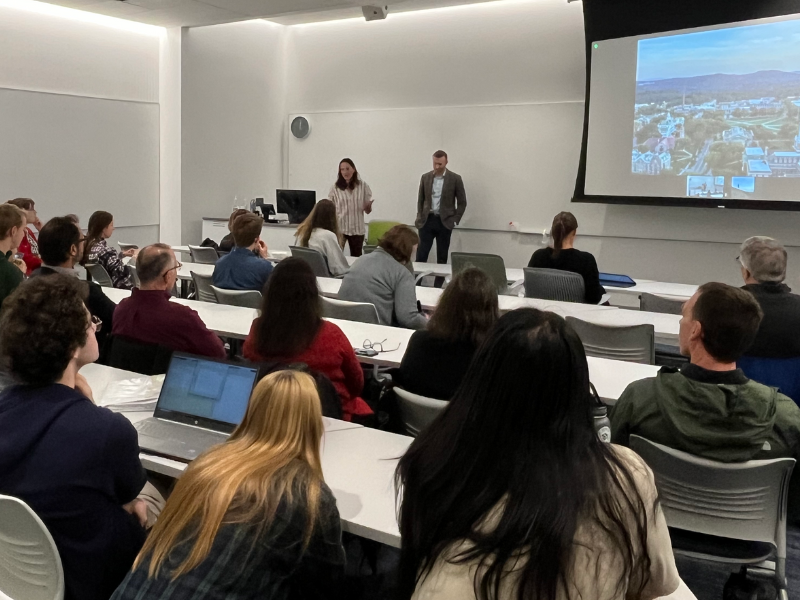
Dartmouth celebrated the breadth and depth of climate and energy activities with our second Climate and Energy week at the beginning of October. Kicking off with a talk on the college's own campus energy transition and culminating in the Dartmouth Energy Alliance's second Energy Hackathon, the week was filled with a range of activities, from panels, to films, to a faculty symposium, and a talk on energy in Africa by the 2023 McGuire Prize for Societal Impact winner, Irving Institute Advisory Board member Rose Mutiso '08, TH'08. Here are some highlights from this energizing week!

The week kicked off on Tuesday, October 10, when Dartmouth Senior Vice President of Capital Planning and Campus Projects Josh Keniston and Sustainability Director Rosi Kerr presented updates on campus decarbonization efforts to a full house in an Irving Institute classroom. The duo shared information about the challenges presented by moving away from fossil fuels to meet the heating, cooling, and power needs of a campus in northern New England and how the college is approaching the challenge.
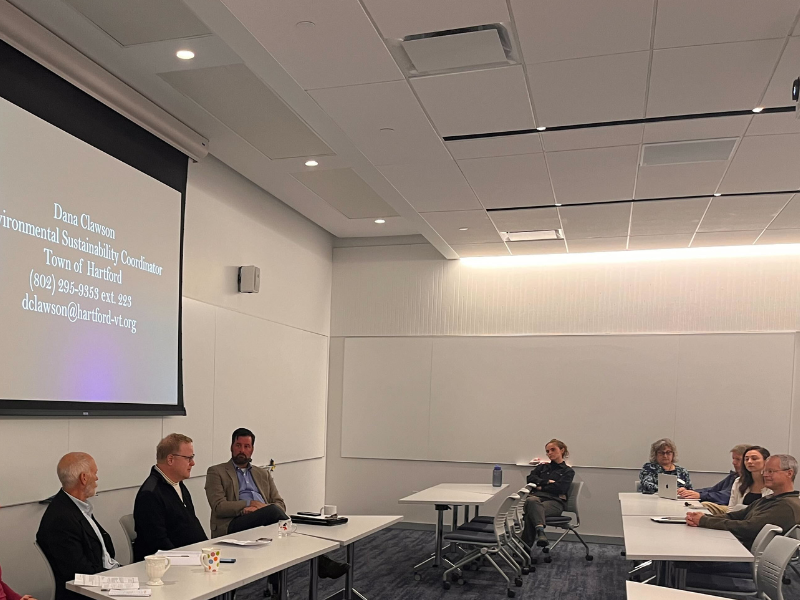
On Tuesday evening, energy practitioners from Vermont and New Hampshire shared their experiences and perspectives on the two states' approach to transitioning to sustainable and equitable energy systems in a public event co-hosted by the Dartmouth Energy Justice Clinic and the Irving Institute.
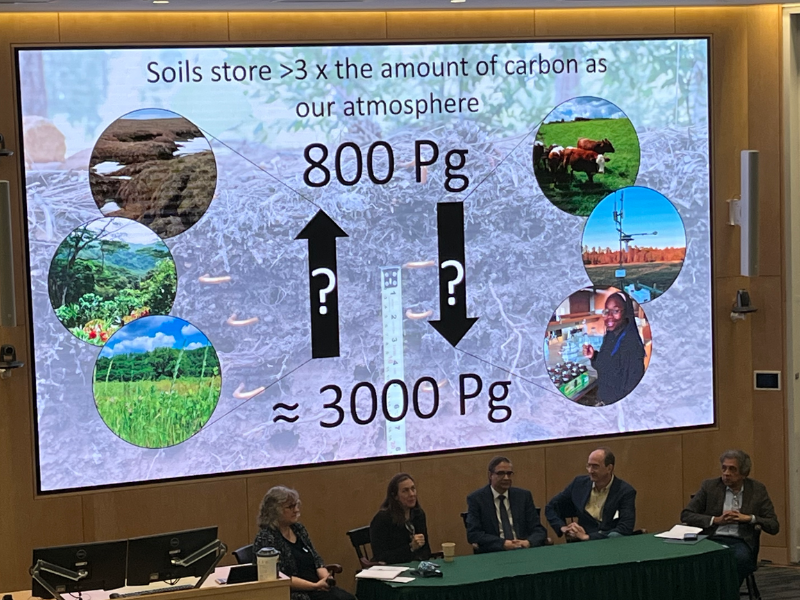
More than 100 Dartmouth faculty, postdocs, and graduate students attended our second annual showcase of Dartmouth research on climate, health, sustainability, energy and society on October 11. More than 40 faculty members gave "lightning talks" — three-minute presentations with two-to-three slides — on their current research interests. Faculty also participated in two panel discussions related to their area of expertise – one on climate modeling and forecasting and the other on carbon capture and sequestration. The symposium offers this audience an opportunity to learn about their colleagues' research and potentially make new connections that could lead to future collaborations. After the symposium, about a dozen attendees joined members of the Irving Institute team on a tour of nearby lab spaces, both in the Irving Institute building and in Dartmouth's West End Innovation District.
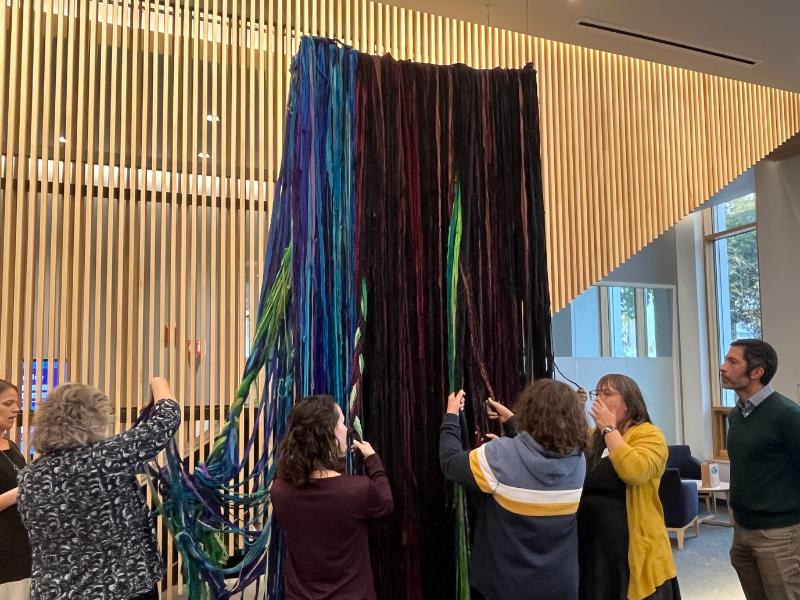
On Wednesday afternoon, the Institute hosted an art opening and artists talks for two climate-and-energy focused art installations. The first, located in the Institute atrium, is an interactive fiber installation, Energy Pools. The piece uses recycled or renewable textile strands to represent U.S. energy consumption in 2018. As artist Jacqueline Wernimont, Associate Professor of Film and Media Studies explains, "Embedded in the interior are an additional 400+ strands representing what we need to do to transform our energy supply to meet the IPCC goal of keeping anthropogenic global warming at +1.5 C by 2030. The piece invites the audience to pull the future into the present by braiding out the energy sources that we need to downscale and replace with renewable energy sources."
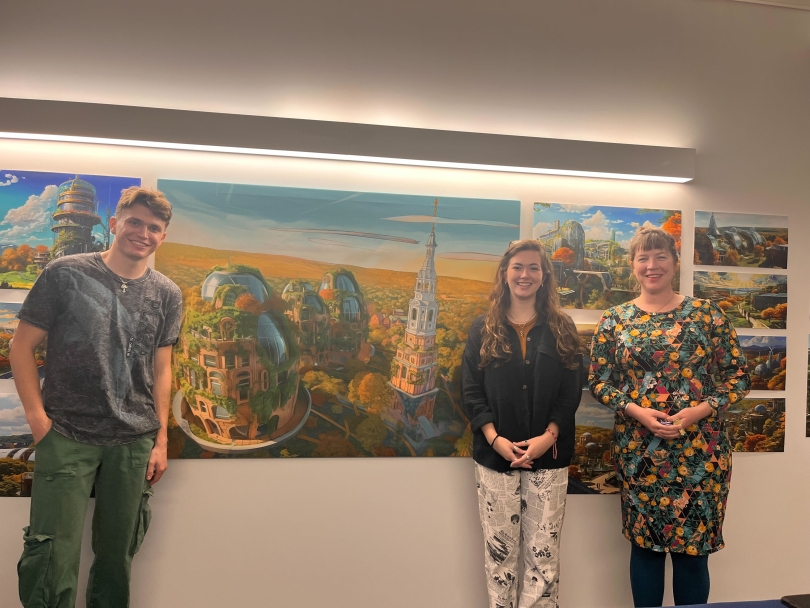
The second piece, "Solarscapes: Imagining Solarpunk Futures for Dartmouth," created by student Jeremy Hadfield '22, TH'23, is installed in the new third-floor gallery space of the Institute. The installation features dozens of AI-generated imagery and video to "confront… Dartmouth's history of dependence on fossil fuels and its complex relationship with the environment while embracing the possibility of healing, regeneration, and abundance."
Both installations are open for viewing Monday-Friday, 7 a.m. - 4 p.m.
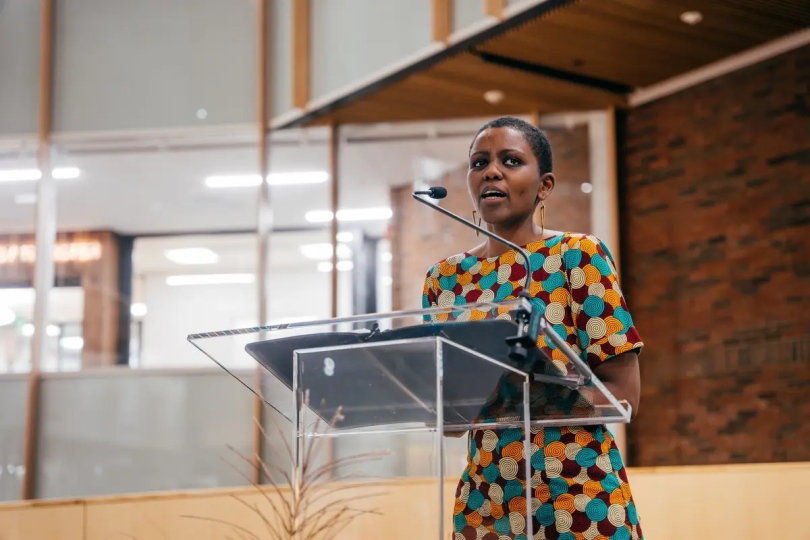
Thursday, October 12 was a special day for the Irving Institute, as our Advisory Board member Rose Mutiso '08, TH'08 was honored as the 2023 winner of the McGuire Prize for Societal Impact. The prize recognizes a member of the wider Dartmouth community who is making a significant positive impact on humanity, society, or the environment. Dr, Mutiso gave a public talk, Reframing the Debate on Africa's Energy Future, and was later celebrated with a special ceremony at the 2023 Climate and Energy Week Dinner. You can watch a recording of her talk here and view a video about Dr. Mutiso's thoughts about the prize and her Dartmouth experience here.
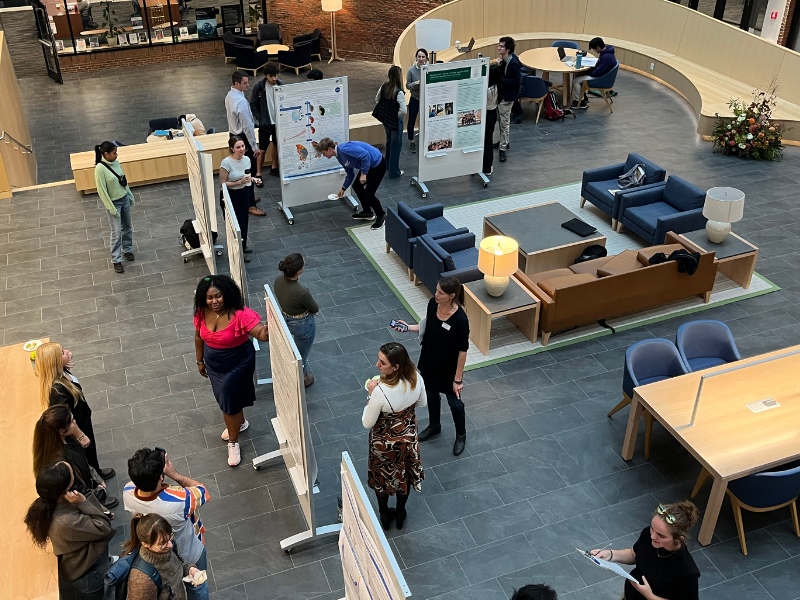
During Climate and Energy Week, visitors to the building's atrium had the opportunity to view nearly 20 posters focusing on Dartmouth climate and energy activities. Representing a range of topic areas, from research on offshore wind, biofuels in Uganda, and the role of the fossil fuels industry in funding academic energy and climate research, to activities like TuckLAB: Energy, the Dartmouth Energy Alliance, and more, the Institute was thrilled to have so many participants share their work with the community. The poster creators spent several hours on Friday talking about their posters with visitors and judges, and while all of the submissions were excellent, the following groups were awarded prizes for their posters:
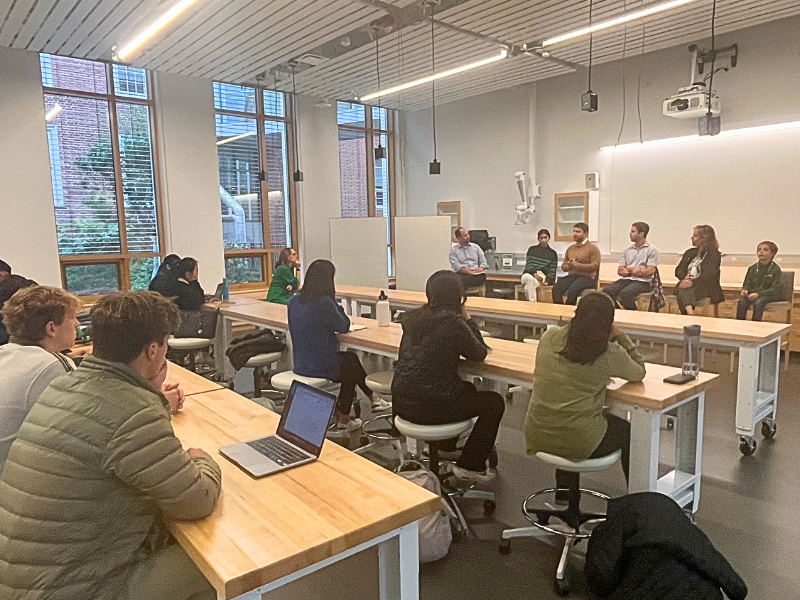
On Friday afternoon, the Revers Center for Energy, Sustainability and Innovation hosted a careers panel for undergraduates students featuring recent Tuck alumni. Moderated by Revers Center Executive Director Jonathan Silverthorne '08, the panel gave undergraduates an opportunity to learn more about climate and energy career pathways in business and industry. Thanks to Tuck alums Pooja Yadav T'18, Managing Director, Office of Equity and Investment Funds; Holland Davis T'18, Vice President, HarbourVest; Anna Foglesong T'08, Managing Director, Clean Grid Initiative; and to current Tuck student and Dartmouth Energy Alliance co-founder Jordan Swett TU'25, who shared their time and perspectives with our students.
On Friday evening, the Institute screened a documentary called Oil Machine, and was able to invite one of the film's producers, Sonja Henrici, to introduce it. Students and members of the public viewed the film, which focused on the world's reliance on oil and the need to transition away from fossil fuels, and engaged in a lively conversation that highlighted the challenges and opportunities of this transition, moderated by Environmental Science Professor Michael Cox, after the movie.
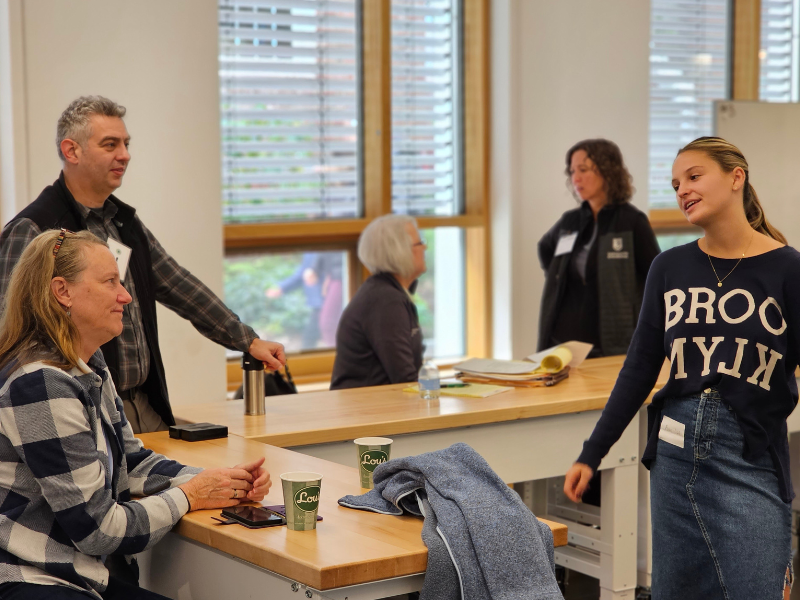
And rounding out the week was the Dartmouth Energy Alliance's second annual Energy Hackathon. About 25 students participated in this year's event, which challenged teams of Dartmouth students to choose a real-world energy or climate problem and spend the day working together to propose a solution. Dartmouth faculty and alumni were on hand to help advise the groups and award prizes, and students reported having a fun and productive experience. Pictures to come!